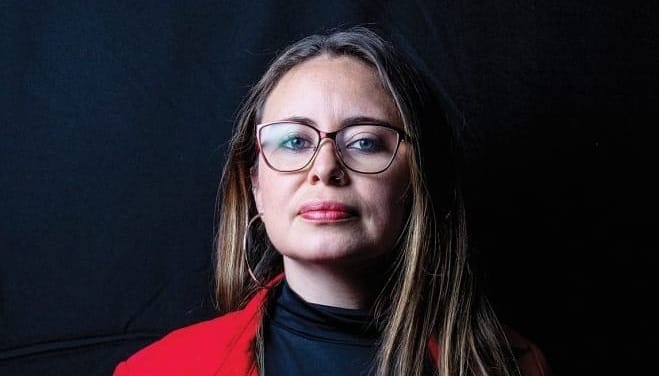Por Laura Coronado Contreras

Tras años de subir selfies, compartir diariamente imágenes del gimnasio o de escapadas a la playa, las mujeres libremente podíamos mostrar nuestras distintas facetas y, aunque habían existido rasgos de violencia digital a través de comentarios fuera de lugar, el ciberespacio era “nuestro espacio”. Un lugar para intercambiar opiniones, divertirse, informarse, entretenerse y comerciar. Un medio mucho más democratizador y, en cierta medida, más igualitario.
A pesar de que han sido noticia relevante algunos casos de ciberacoso, que hemos escuchado del daño que las redes pueden causar a mujeres adolescentes o la lucha por la entrada en vigor de la llamada “Ley Olimpia”, las redes sociales implicaban un enorme reto pero, a la vez, una gran posibilidad para acceder al conocimiento, emprender y crear comunidad. La distribución porcentual de los usuarios de redes sociales en México en enero de 2024 muestra, en todos los rangos de edad, una mayor participación de las mujeres. Por ejemplo, entre los jóvenes de 18 y 24 años, el 14.2% son usuarias frente al 12.6% de hombres. (https://es.statista.com/estadisticas/1139347/distribucion-redes-sociales-usuarios-edad-genero-mexico/)
¿Permitiremos que la violencia digital nos robe estos lugares y las oportunidades que hemos disfrutado hasta ahora en el ciberespacio?
La IA nos está mostrando una cara mucho más peligrosa y alarmante de la tecnología: que nuestra imagen “no nos pertenece” o “nos pertenece menos” en la era digital. Por ello, escándalos como el de los 15 adolescentes españoles que manipularon las fotografías de sus compañeras menores de edad, literalmente unas niñas, para extorsionarlas o venderlas como material pornográfico, son solamente la punta del iceberg de lo que podría pasarnos a cualquiera de nosotras. ¿Cómo reaccionaremos cuando desde un celular y con un par de clics un traje de baño se convierte en lencería o un top en un desnudo? ¡Qué difícil enseñarles a nuestras hijas, sobrinas o alumnas! ¡Qué complicado vivirlo!
No se trata de diluir las implicaciones graves que tiene el uso sin consentimiento de nuestras imágenes, mucho menos de minimizarlas u ocultarlas porque son de carácter íntimo. Son conductas delictivas graves que ameritan una sanción y que no pueden, ni deben, quedarse en frases como “no es para tanto”, “no fue físico, fue virtual”, “son unas escandalosas”, o “en qué te afecta”. Nuestras imágenes son parte de nuestra identidad, reflejan nuestra personalidad e influyen en nuestras relaciones con los demás. No hay nada más real que lo virtual. Un contenido digital permanece y puede ser reproducido infinitamente y sin control. Es por ello, que gran parte de las víctimas de este delito sufren de ansiedad, trastornos para dormir y por desgracia, algunas intentan suicidarse y otras más lo consiguen.
Es así que, acompañarlas sin juzgar, haciéndolas sentirse queridas y aceptadas en cada etapa de su vida es vital. Tristemente decirles que “no son sólo una imagen”, es un “escudo” para demostrarles que su vida no se constriñe a las redes sociales o lo que los demás digan o piensen de ellas. Todas podemos ser víctimas, pero también sobrevivientes, acompañantes y, especialmente, luchadoras para que formemos a mujeres valientes, responsables, libres, y hombres que no consuman contenidos pornográficos, denuncien o reporten imágenes nocivas y, particularmente, conozcan que no es “una broma” utilizar la tecnología para dañar a los demás o verlos como simples objetos.
La regulación es indispensable y las reformas a las normas penales y a la Ley de Acceso a las Mujeres a una Vida Libre de Violencia en nuestro país son un gran paso pero nos falta aún, mucho camino que recorrer. Aún faltan grandes tareas: la formación de personal sensible a estos temas en las fiscalías, la optimización de los tiempos en los procesos, representantes de las víctimas que cuenten con los medios para conseguir las pruebas de la manipulación, respuestas ágiles de las plataformas sobre los usuarios que delinquen a través de ellas. Todo ello redundará en una mayor cultura de la denuncia y aminorará el ya tortuoso proceso de verse distorsionada, cosificada, extorsionada o comercializada.
Dice el proverbio que “una imagen vale más que mil palabras” pero nuestra paz, nuestra libertad, que nuestra voz sea escuchada y sigamos beneficiándonos de la era digital, no tiene precio.
*Laura Coronado Contreras
* Experta en Cultura Digital
* Autora de “Familias enredadas: cultura digital para papás, novatos y todos los que quieran aprender del sano uso de las redes sociales”
* Miembro Nivel I del Sistema Nacional de Investigadores del CONAHCYT
Las opiniones expresadas son responsabilidad de sus autoras y son absolutamente independientes a la postura y línea editorial de Opinión 51.






Comments ()